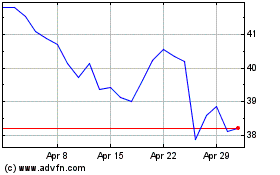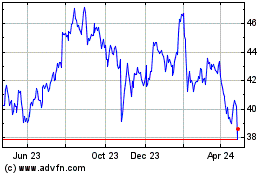By Stu Woo and Ben Dummett
LONDON -- The same type of blind auction used to pick players in
fantasy football leagues could decide the fate of Sky PLC, a media
company that employs 30,000 people and has a stock-market value of
$36 billion.
Comcast Corp. on Saturday is slated to bid against a team of
Walt Disney Co. and 21st Century Fox Inc. in a day-long auction
here that -- if it goes down to the wire -- will culminate in the
two sides submitting secret bids to a British regulator. A winner
will be disclosed later in the day.
Blind-auction strategy is complex, as each side tries to figure
out how much it needs to pay to win while trying to avoid
overspending. It has fostered a cottage industry of auction
consultants, many of whom hold doctorates in game theory, a branch
of math that studies how players in strategic contests make
decisions. While investment bankers are used to engaging in such
high-dollar auctions, it is unusual to have a government-mandated
"sealed-bid" process for such a big, publicly traded company.
"Game theory as a topic is well-understood by academics and has
long been studied, but game theorists who also understand the
market context are not that common," said Steve Blythe, who
oversees cellular-airwave auctions for French wireless carrier
Orange SA.
Complicating matters in the Sky auction: Fox already owns 39% of
the London-based company, and Disney earlier this year agreed to
buy a big chunk of Fox, including its Sky stake.
That arrangement puts Disney and Fox on the same side of the
table, but with Disney calling the shots. It also gives Disney an
incentive to maximize bidding, even if it doesn't ultimately
prevail. A higher price would allow Disney to offload its Sky stake
at a premium -- though it doesn't necessarily have to sell.
Fox, Comcast and Sky declined to comment on the auction. Disney
didn't respond to requests for comment. Rupert Murdoch and his
family are major shareholders of Fox and News Corp, which publishes
The Wall Street Journal.
Mr. Murdoch has long sought to consolidate his holding in Sky.
Disney and Comcast see Sky as a way to expand internationally. The
broadcaster also sells wireless, TV and internet services
throughout Europe, and it is a media company that produces its own
news, entertainment and sports programming.
Both sides agreed to the auction's terms. The U.K Takeover
Panel, the agency running the auction, polices big deals involving
British companies. It has the power to force a formal auction to
prevent a never-ending series of bids and counterbids, and it
worked out the process with the companies.
Under the auction rules, only Fox can bid in the first round
because Comcast enters the processing having already made a higher
bid. In the second round, Comcast can counterbid. If that doesn't
determine a winner, each side can submit sealed-bid offers in the
third and final round.
Maher Said, a New York University Stern School of Business
professor who focuses on auctions, said the first step in an
auction like this is figuring out how much the asset is really
worth to you, and then what you think it's worth to your rival.
Next is gaming out a range of possible bids from your rival.
"The concern is you don't want to raise the price so high and
end up holding the bag," he said.
Fox initially bid GBP10.75 a share for Sky in December 2016.
Comcast's current offer, made in July, is GBP14.75 a share --
already 37% above Fox's first offer.
Blind auctions are more common in other industries. For example,
wireless carriers often hire outside, game-theory advisers when
bidding for rights to cellular airwaves, which governments
world-wide typically sell at auction.
Not all wireless auctions are blind, but the ones that are tend
to be the hardest kind to prepare for, Orange's Mr. Blythe
said.
"It's difficult to persuade your boss you did a good job," he
said. Here's the dilemma: Bid too low and lose. Bid too high and
risk spending much more money than needed.
For example, let's suppose you bid for a house. Your $450,000
offer wins. But then you learn the second-highest bid was $300,000.
Would you really feel like a winner?
Mr. Blythe's goal is to win cellular airwaves at a price at
which Orange would profit. Failing that, his goal is to make rivals
spend as much as possible, he said. With millions or billions of
dollars on the line, wireless carriers recruit the few top-tier
game theorists with experience.
The tricky part is that buyers might value assets differently.
Consider fantasy-football leagues. Many of these online games give
each player a budget to bid on free agents during the season. This
week, many players are bidding for Atlanta Falcons running back
Tevin Coleman, a second-string player now coveted after an injury
sidelined starter Devonta Freeman.
"If you're looking for a replacement running back, you're going
to be bidding for Tevin Coleman," said Adam Hoffer, a University of
Wisconsin at La Crosse economics professor who co-wrote a paper
about fantasy-football economics. "But you know the person who owns
Devonta Freeman is going to bid high," too.
Write to Stu Woo at Stu.Woo@wsj.com and Ben Dummett at
ben.dummett@wsj.com
(END) Dow Jones Newswires
September 21, 2018 05:44 ET (09:44 GMT)
Copyright (c) 2018 Dow Jones & Company, Inc.
Comcast (NASDAQ:CMCSA)
Historical Stock Chart
From Mar 2024 to Apr 2024

Comcast (NASDAQ:CMCSA)
Historical Stock Chart
From Apr 2023 to Apr 2024
